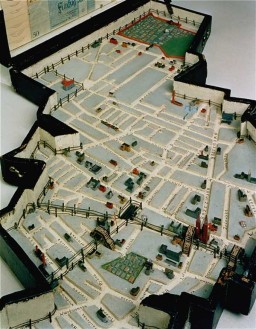
Article
Browse an alphabetical list of articles about the Holocaust and World War II. Learn more about topics such as the Nazi rise to power, how and why the Holocaust happened, life in Nazi camps and ghettos, and the postwar trials.
<< Previous | Displaying results 301-324 of 1086 for "Article" | Next >>
-
Ernst Gläser
ArticleErnst Gläser wrote the antiwar novel "Jahrgang 1902." His works, considered leftist and anti-fascist, were burned in Nazi Germany in 1933. Learn more.
-
Ernst Kaltenbrunner
ArticleBrief overview of the charges against Ernst Kaltenbrunner, Reich Security Main Office leader, during the International Military Tribunal at Nuremberg.
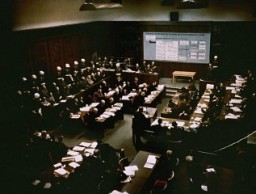
-
Ernst Toller
ArticleErnst Toller was one of the best-known German dramatists of the 1920s. He wrote against Nazism, and was among those whose works were burned under the Nazi regime.
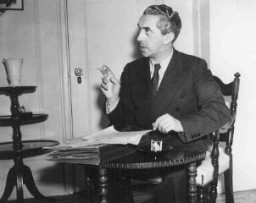
-
Erwin Rommel
ArticleErwin Rommel was commander of the German Afrika Korps in North Africa during WWII. Learn about Rommel's military career, death, and ongoing questions around his commitment to Nazism.
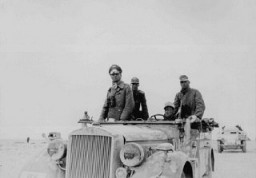
-
Escape from German-Occupied Europe
ArticleMany Jews sought to leave Germany after the Nazi rise to power. After WWII began, escape from areas under Nazi control became increasingly difficult or impossible.
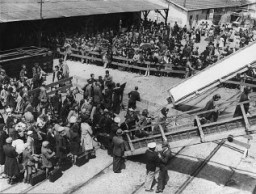
-
Eschwege Displaced Persons Camp
ArticleAfter WWII, many Holocaust survivors, unable to return to their homes, lived in displaced persons camps in Germany, Austria, and Italy. Read about Eschwege DP camp.
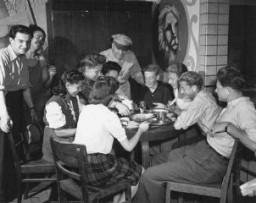
-
Estelle Laughlin
ArticleExplore Estelle Laughlin’s biography and learn about her experiences during the Warsaw ghetto uprising.
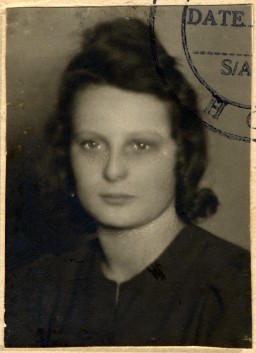
-
Esterwegen Concentration Camp
ArticleEsterwegen was part of the Nazi regime’s early system of concentration camps, created to hold people arrested as opponents of the new regime.
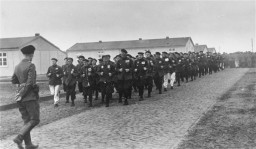
-
Esther Lurie
ArticleArtist Esther Lurie documented life in the Kovno ghetto for its secret archives. Learn about her watercolors and sketches, the majority of which have never been found.
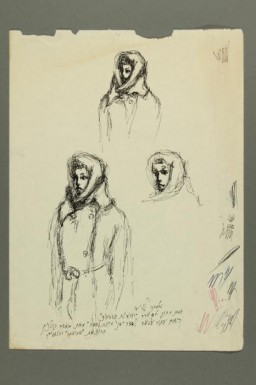
-
Estonia
ArticleBetween 1940 and 1944, Estonia was occupied by the Soviets and then by the Germans. These occupations had a dramatic impact on Jews in Estonia. Learn more.
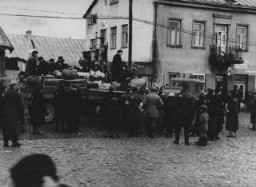
-
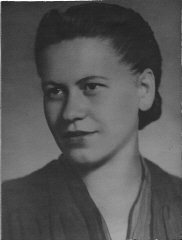
-
Eugenics
ArticleTheories of eugenics shaped many persecutory policies in Nazi Germany. Learn about the radicalization and deadly consequences of these theories and policies
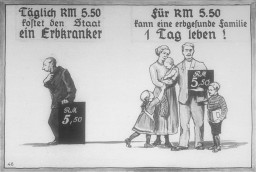
-
Eugenio Gentili Tedeschi
ArticleRead the Jewish Partisan Educational Foundation's short biography of Eugenio Gentili Tedeschi.
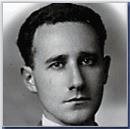
-
Euthanasia Program and Aktion T4
ArticleThe Nazi Euthanasia Program, codenamed Aktion "T4," was the systematic murder of institutionalized people with disabilities. Read about Nazi “euthanasia.”
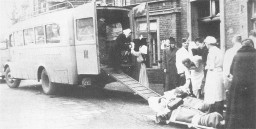
-
Evading Justice
ArticleIn the decades following the Holocaust, the search for perpetrators continued. As they reach the end of their lives, the vast majority of Nazi offenders have escaped punishment.
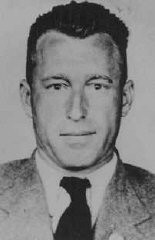
-
The Evian Conference
ArticleAt the July 1938 Evian Conference, delegates from nations and organizations discussed the issue of Jewish refugees fleeing persecution in Nazi Germany. Learn more
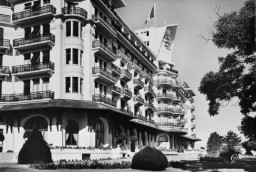
-
Evidence from the Holocaust at the First Nuremberg Trial
ArticleProsecutors before the IMT based the case against 22 leading Nazi officials primarily on thousands of documents written by the Germans themselves. Learn more.
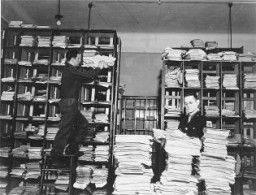
-
Excerpts from the President's Commission Report
ArticleIn 1978, the President's Commission on the Holocaust was charged with submitting a report on the creation of a Holocaust memorial in the US. Read excerpts.
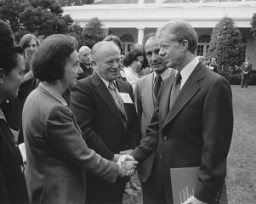
-
Exodus 1947
ArticleThe plight of Jewish refugees aboard the Exodus 1947 captured the world's attention and symbolized the struggle for unrestricted immigration into Palestine.
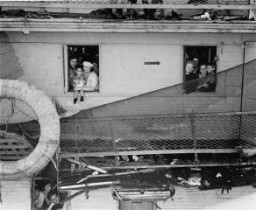
-
The Farhud
ArticleThe Farhud (pogrom), an outbreak of mob violence against Baghdad Jewry in June 1941, was a turning point in the history of Jews in Iraq. Learn more
-
Fascism
ArticleFascism is a far-right authoritarian political philosophy. Learn about the history and principles of fascism and its implementation in Nazi Germany.
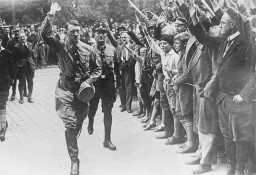
-
Father Jacques
ArticleFather Jacques (Lucien Bunel) provided refuge to Jews and others at a school in Avon, France. Imprisoned in several Nazi camps for his activities, he died soon after liberation.
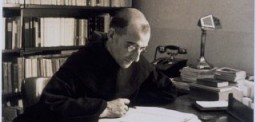
-
Faye Schulman
ArticleRead the Jewish Partisan Educational Foundation's short biography of Faye Schulman.
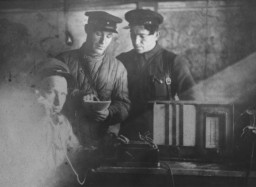
-
Featured Artifact: Model of the Lodz Ghetto
ArticleLeon Jakubowicz began constructing a model of the Lodz ghetto in the spring of 1940, after the ghetto was sealed. Explore the artifact and Leon's story.
